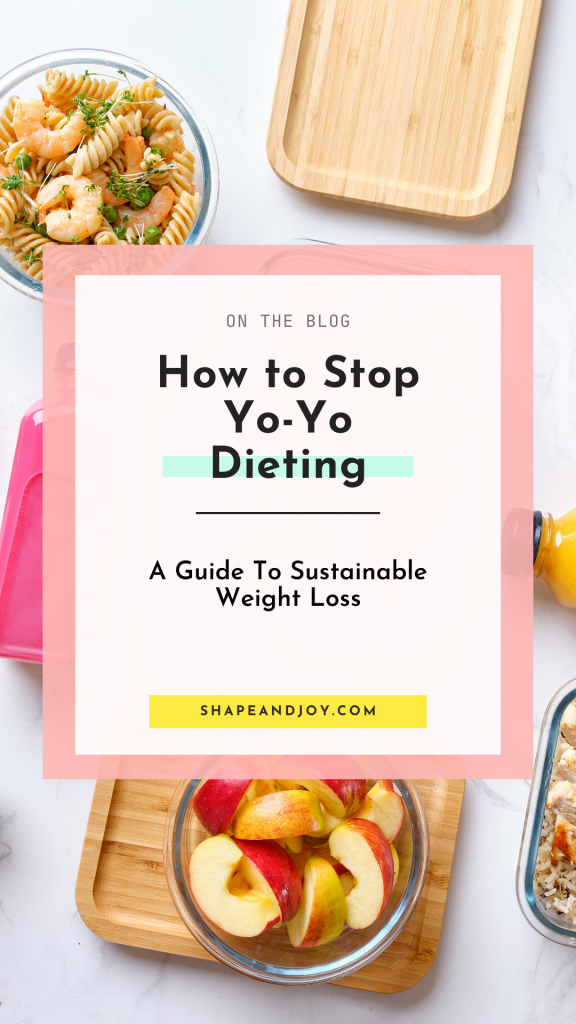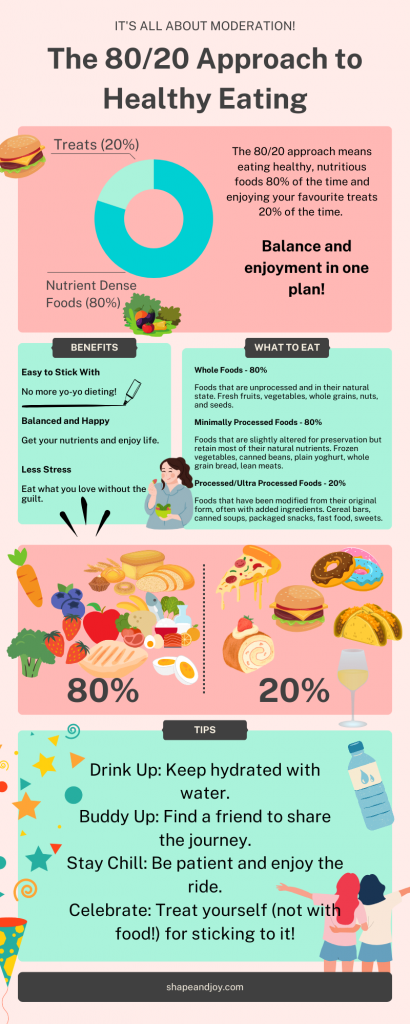This post may contain affiliate links, which means that I may earn a commission if you click on the link, with no cost for you. It’s one of the ways I support my blog. You can read more about this here.
Introduction
As the world of health and fitness continues to grow, many of us feel overwhelmed when it comes to figuring out what works for us and what doesn’t. It’s easy to get stuck in a cycle of yo-yo dieting, where you make great progress for a short period of time, only to crash and burn once you lose motivation. But what if you could break the cycle and find a sustainable and realistic way to reach your weight loss goals?
A fad diet is typically a diet that encourages fast weight loss, with little regard to health or long term sustainability and are often lacking in essential nutrients we need. These diets often promise unrealistic results, with little evidence to backup claims.
While you may lose a significant amount of weight while doing a particular diet, these diets often do more harm than good, as they can lead to nutrient deficiencies and can risk long-term metabolic damage. The results are often short-lived as you will have to eventually stop the diet, leading to a dangerous lose-gain-lose-gain cycle (yo-yo).
For these reasons, quick-fix diets should always be approached with caution and a healthy dose of scepticism. The best way to lose weight and keep it off permanently is to create a healthy diet and lifestyle that is tailored to individual needs and preferences, and can be sustainably maintained over time.

Moving Away from All or Nothing Thinking
This is essentially what yo-yo dieting is. An all-or-nothing approach keeps you trapped in a cycle of either being “perfect” on your chosen diet or “going off the rails” and binging all those foods you’ve been missing out on – with the promise that you will start again next week/month.
To ditch the all-or-nothing approach, focus on minor yet impactful changes. Incorporating more nutritious and filling foods into your diet, staying hydrated, and finding enjoyable ways to exercise can significantly contribute to your goals over time. Please don’t concern yourself with perfection; instead, celebrate every accomplishment, regardless of how small they might seem. Remember, progress is progress, and it is worthwhile, no matter how insignificant it may appear.
The key here is setting achievable goals and realistic time-frames. Instead of attempting to lose a significant amount of weight rapidly, take your time and aim for gradual progress. Permit yourself to indulge occasionally while prioritizing self-care. Punishing yourself for slip-ups or depriving yourself of the things you enjoy only leads to negative consequences. So, be gentle with yourself and keep in mind that it’s about progress, not perfection!
Establishing Healthy Habits that Support Weight Loss
By practising positive habits, we can become better versions of ourselves and achieve our goals. On the other hand, negative habits can hold us back and hinder our progress. Therefore, it’s important to be mindful of our habits and strive to make them align with our goals.
By introducing small positive habits to our routines slowly and sustainably, we can avoid being in the ‘All-or-nothing’ mindset that often leads us into a yo-yo dieting cycle.
Remember to be patient and kind to yourself throughout this process. It’s okay if you experience setbacks or struggle to make progress at times. The important thing is to keep moving forward and stay committed to your goal. With dedication and persistence, you can create positive habits that will help you achieve your aspirations.
As with any habit, the ability to sustain it comes from practice and a clear understanding of why it’s important to keep going. Each choice you make, every movement and action you take, is a building block added to the life you’re creating for yourself. Every step is a part of the journey. So, make sure that the habits you cultivate are ones that will bring you closer to your goal.
3 Mistakes To Avoid If You Want To Lose Weight
Understanding & Increasing NEAT
NEAT stands for Non-Exercise Activity Thermogenesis, it is the energy that we use in daily life just moving around and living our lives i.e. walking up the stairs, doing housework, playing with pets or children etc.
NEAT makes up part of our TDEE (Total Daily Energy Expenditure) and can make up around 15 to 30 percent of the calories we burn each day and actually has a greater impact on calorie burning than traditional exercise.
Working out can certainly help burn calories and improve overall health, but it typically requires a more concentrated effort and a specific amount of time set aside for exercise. Incorporating more NEAT into our daily routines, such as taking the stairs instead of the elevator or standing up during phone calls, can be a simple yet effective way to increase calorie burning and improve overall health.

Eating for Fullness & Mindful Eating
Learning which foods promote satiety is a key step in stopping yo-yo dieting. Instead of thinking about how much you can’t eat, think about what foods you can add to your meals to keep you feeling fuller for longer. This usually includes foods that are whole or minimally processed, high fibre & high protein foods.
High-fibre foods that promote satiety include:
- Fruits
- Vegetables
- Whole grains
- Legumes.
Examples of high-protein foods include:
- Lean meats
- Fish
- Poultry
- Eggs
- Tofu
- Beans
Adding healthy fats to your meals can also help to promote satiety, and some great sources of healthy fats include nuts, seeds, avocados, and olive oil.

It’s important to note that everyone’s body is different, and what works for one person may not work for another. Experimenting with different foods and finding what works best for you can be a helpful approach.
It’s also important to listen to your body and stop eating when you feel full, rather than continuing to eat until you’re uncomfortably full. By practising mindful eating, you can learn to recognise when you are full. Really pay attention to your meals and savour each bite, try to avoid watching TV or being on your phone while you’re eating as this can often lead you to overeat.
The Downside Of Calorie Counting For Weight Loss

Prioritising Lifestyle Change Over Quick Fixes
Taking the time to implement sustainable lifestyle changes allows us to create lasting habits that support our overall well-being. By focusing on factors like nutrition, exercise, and even sleep, we can make positive changes towards stopping yo-yo dieting forever.
A holistic approach to weight loss ensures that we are not just focused on short-term results, but are committed to making lasting improvements for a healthier life. Prioritizing lifestyle change is an investment in yourself that pays off in the long run.
Aim to make small, sustainable changes that you can maintain over time. This could mean incorporating more fruits and vegetables into your diet, or finding exercise that you enjoy. Remember, weight loss is not a one-size-fits-all solution. What works for someone else may not work for you. Listen to your body and do what feels right for you. And most importantly, be patient with yourself.
Changing habits and achieving weight loss takes time, but with consistency and determination, you can reach your goals.
5 Foods That Will Keep You Feeling Full While Cutting Calories – Eat More, And Still Lose Weight!
Conclusion
Prioritising our health and well-being is essential for leading a fulfilling and joyful life. Hopefully, this post has highlighted the various aspects of health, fitness, weight loss, and lifestyle, and the importance of finding a balance that works for each individual.
Again, weight loss is a personal journey, and there is no one-size-fits-all solution. Each person’s body is unique, and what works for one may not work for another. It is essential to approach our health and weight loss goals with patience, self-compassion, and a focus on long-term sustainable habits rather than quick fixes.
Ultimately, the pursuit of health, fitness, weight loss, and lifestyle choices should be driven by a desire to live our best lives. By incorporating regular exercise, nutritious eating, and positive lifestyle habits, we can improve our physical and mental well-being, increase our energy levels, and enhance our overall quality of life.
So let us be proactive in our commitment to our health and happiness. Let us choose to prioritise self-care, make mindful choices, and ditch yo-yo dieting for good!

